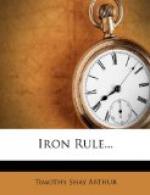“My dear mother:—I have left my home—forever! What is to become of me, I do not know. But I can remain with you no longer. Father treats me like a dog—or worse than a dog; and he has never treated me much better. I have tried to do right a great many times; but it was of no use. The harder I tried to do right, the more he found fault with me. He was always blaming me for something I didn’t do. It is all a lie of the watchman’s about my setting the house on fire. Such a thing never entered my mind. Father (sic) would’t let me in, and I had to sleep somewhere. He wouldn’t speak a word for me in the Mayor’s office. So it’s all his fault that I am to be tried before the Court. But I’m not going to be sent to the Penitentiary. Father is my bail for a thousand dollars. I shall be sorry if he has to pay it; but it will be better for him to do that, than for me to go to the Penitentiary for nothing. So, good-by, mother, I love you! You have always been good to me. If father had been as good, I would have been a better boy. Don’t grieve about me. It’s better that I should leave home. You’ll all be happier. If I ever return to you, I will be different from what I am now. Farewell mother! Don’t forget me. I will never forget you. Don’t grieve about me. The thought of that troubles me the most. But it is better for me to go away, mother—better for us all. Farewell.
“Andrew.”
CHAPTER X.
A year elapsed before any tidings of the wanderer came. Then Mrs. Howland received a few lines from him, dated in a Southern city, where he spoke of having just arrived from South America. He had little to say of himself, beyond that he was well; and did not speak of visiting home.
After reading this letter, Mrs. Howland placed it in the hands of her husband, who read it also, and then gave it back without a remark. He checked an involuntary sigh as he did so. Not the slightest reference was made to him by his son; a fact that he did not overlook, and that he did not observe without a sense of disappointment. The long absence of his wayward boy had softened his feelings toward him; and with pain he remembered many acts of harshness that now seemed to have in them too much of the element of severity. At the term of the Court, which was held soon after Andrew went away, the Grand Jury failed to obtain sufficient evidence to justify the finding of a bill against him, and released the security given for his appearance at Court. This fact, with a previous questioning of the policeman by whom Andrew had been arrested, satisfied Mr. Howland that the boy had been unjustly suspected of an intention to commit a crime. But this conviction had come too late. The effects of that unjust accusation had already fallen in sad consequences upon the head of the poor boy; and the father could not force from his mind the painful conviction that he was, mainly, responsible for these consequences.




